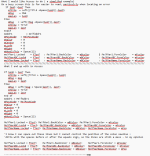Cotswold
Well-known member
- Local time
- Today, 21:29
- Joined
- Dec 31, 2020
- Messages
- 1,035
I came across this the other day from another Forum. It is written by Eric Lendvai and I thought some may find it interesting?
Eric clearly has little, if any experience of Access, as it isn't mentioned. But you will be able to add your own pros & cons on Access anyway.
I have posted it because when you search for language comparisons, the results are only adverts. The days of using Google to obtain commercially unrelated opinions are long gone. It has been adverts, or nothing for maybe ten years now.
Eric clearly has little, if any experience of Access, as it isn't mentioned. But you will be able to add your own pros & cons on Access anyway.
I have posted it because when you search for language comparisons, the results are only adverts. The days of using Google to obtain commercially unrelated opinions are long gone. It has been adverts, or nothing for maybe ten years now.

